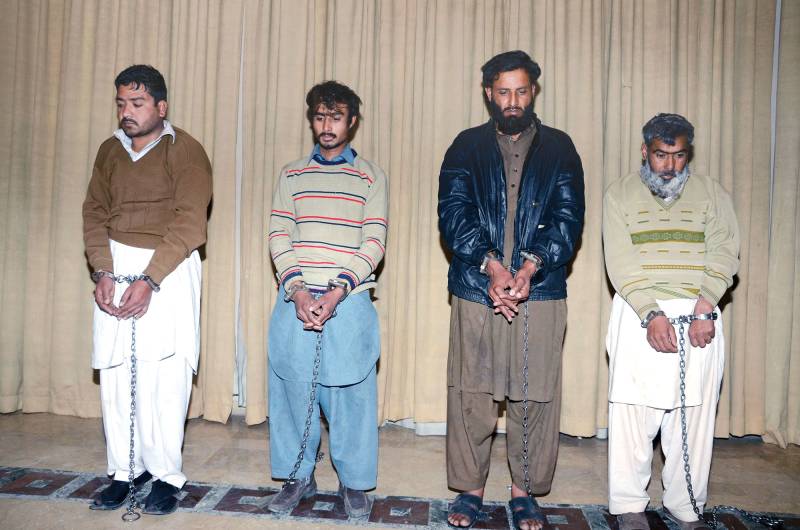PESHAWAR - The security agencies have arrested five men accused of helping organise Wednesday’s attack on Bacha Khan University that killed 21 people, the military announced yesterday. The attackers were trained, brought and handled from Afghanistan, Inter Services Public Relations (ISPR) chief Lt-Gen Asim Bajwa said. “The five facilitators have been arrested and another one, whom I will call terrorist-A, is still at large,” military spokesman Lieutenant General Asim Bajwa told a televised press conference at Corps Headquarters, Peshawar. Raids were being conducted to arrest that man, his wife and niece, he added.
According to the officer, “terrorist-A” arranged transportation for the four gunmen who travelled from Torkham, which borders Afghanistan. The suspects also secured accommodation for the assailants and provided them with a rickshaw that they used on the day of the attack. They also helped purchase their weapons in the country’s tribal belt and relied on women close to the accused to help smuggle guns. “Women wearing traditional veils do not usually undergo a routine body search at the checkpoints,” said Bajwa.
He went on to confirm that authorities believe the assault on the university was planned and directed by militant groups residing in Afghanistan, adding that one of the organisers had made as many as 10 calls to the attackers on a mobile phone that had an Afghan SIM card. On Friday, the Taliban faction behind the massacre at Bacha Khan University posted a video message vowing to target schools throughout the country, calling them “nurseries” for people who challenge Allah’s law.A terrorist named Umar, whose deputy is Zakir, planned the attack on the Pakistani university while operating from Afghanistan, the ISPR director general said. “The four attackers - Ali, Usman, Umar and Abid - were trained in Afghanistan. They crossed into Pakistan via Torkham like ordinary travelers and used public transport to reach district Mardan,” he said.
The arrested facilitators of the terrorists – Adil, Noorullah Ibrahim, Riaz and Zia - were presented before the media on this occasion. Lt-Gen Asim Bajwa said that one facilitator, terrorist A, who is still at large, brought the attackers to Mardan from Torkham where they were received and sheltered by Adil and Noorullah who kept the terrorists in a house in Mardan on the Charsadda Road. They also helped the terrorists buy weapons from Darra Adam Khel. He said that facilitator ‘A’ helped them transport these weapons to Mardan. Bajwa said that Adil is a carpenter, who also worked in the attacked university for some time. He drew a map of the university and remained involved in planning the attack. Adil is the one who helped the attackers figure out their way into the university. Noorullah bought an auto rickshaw and transported the terrorists to sugarcane fields near the university, he added.
ISPR DG also showed the movement of the attackers with the help of a map. He said that Umar, the main commander, who was in Afghanistan called a reporter during the attack. The phone call was also played before media. Responding to a question, Gen Bajwa said that Afghan government was not (officially) blamed for the attack. “We only said that the attack was planned and handled from Afghan soil.” He said that investigation was still underway to confirm financial resources of terrorists. He said that a terrorist murdered in the attack, Amir ur-Rehman, belonged to South Waziristan while identity of the three others was being tried to be established through DNA tests and Nadra record.
Terrorism is a global challenge that many countries are facing. Majority of the targets set for operation Zarb-e-Azb have been achieved, the DG added. Giving details, he said that nearly 14,000 operations have been conducted and 21,000 people have been arrested. The military intensified an ongoing offensive against extremists in Pakistan’s tribal areas after attack on the Peshawar school in 2014. The government also launched a National Action Plan cracking down on extremism. Security improved in 2015 but critics have repeatedly warned the government is not taking long-term steps to tackle the underlying causes of extremism.






